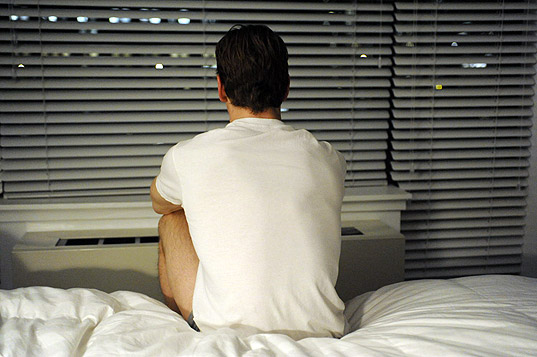
Shame

SHAME (CINEMA)
Momentum Pictures
Release: January 13th, 2012
Certificate: 18
Running time: 101 minutes
Director: Steve McQueen
Writers: Steve McQueen, Abi Morgan
Composer: Harry Escott
Cast: Michael Fassbender, Carey Mulligan
Early into the film, Sissy (Carey Mulligan) takes to the stage in an elegant, under-crowded rooftop bar where she sings a haunting version of the popular 1977 classic, New York New York.
Like the film, the song is painfully restrained, minimalist and delivered with an overwhelming sense of defeat that subverts a traditionally upbeat theme to one of longing and despair. It is a scene that illustrates the style, technique and underlying message of Steve McQueen’s most recent work, Shame (2011).
In the light of the award-winning success of McQueen’s previous feature, Hunger (2008), his latest film retains a familiar stylistic formula consisting of lingering camera movements, over-extended sequences, limited dialogue and an extraordinary performance delivered by Michael Fassbender in the lead role.

Shame tells the story of Brandon Sullivan (Fassbender), a withdrawn middle-aged man living and working in New York City. While his lifestyle may exhibit the luxurious comforts of any bachelor on a corporate pay role, Brandon’s existence behind closed doors is a constant battle as he tries to manage his addiction to sex.
We are introduced to Brandon at a point where his compulsive behaviour becomes barely manageable through a routine of self-pleasuring bathroom breaks at work and an oversaturation with prostitutes and pornography at home. Although Brandon’s carefully constructed private life seems to be the only thing that is keeping him afloat, he suddenly finds his world disrupted by an unexpected appearance from his estranged sister, Sissy, (Carey Mulligan), who arrives with her own set of problems.
Sissy’s erratic and deeply dependent personality pushes Brandon into a protective big brother role which he instinctively adopts. However, the relationship between siblings breaks apart as Brandon is no longer able to maintain his private lifestyle and his compulsions begin to surface. A sense of paranoid self-loathing builds in Brandon’s mind as he finally loses control.
Do not mistake this plot for one that handles its subject matter lightly. While the focus may be on consensual sex, this is a serious film about sex addiction. Steve McQueen shows Brandon’s struggle through a sympathetic lens and uses the busy streets and dull lights of New York to construct a maze in which Brandon must co-exist with his problems in lonely anonymity. Shame is riddled with stylised technique that hints at McQueen’s background as a Turner Prize winning visual artist.

Dominated by extended sequences with a carefully constructed mis- en-scene, the film relies heavily on the performance of the actors, where the minimal editing creates a sensation of observation rather than direction, enabling us to naturally pick up on the subtleties of the characters’ behaviour and expressions.
These long sequences also work to highlight the quality of the performances of both Fassbender and Mulligan. As film siblings, the two actors dive into their roles that go beyond the standard ‘onscreen chemistry’, giving a realistic portrayal of a brother and sister relationship with questionable boundaries.
McQueen’s choice to work once again with Fassbender proved a success as he fully justified the acting skills he exhibited in Hunger. Further supporting this are his nomination for the 2012 BAFTA award for Best Leading Actor for his performance in Shame with the film itself gaining a BAFTA nominated for Outstanding British Film.
I went to see Shame on a Friday evening where I noticed that instead of the usual post-film chatter which can be heard rumbling through the corridors, the audience remained seated and sombre once the movie had ended. While it is riddled with ambiguous elements, Shame did not leave me unsatisfied in any respect.
The plot gains it’s depth from what is implied rather than force-fed and you will be left contemplating fragments of a characters dialogue, gestures, expressions and interactions long after the credits role. The content is challenging, the characters discomforting and each scene is beautifully constructed making Shame a movie that I recommend seeing, more than once, to allow it the time and headspace that such a quality film deserves.


Tyson James Yates
Tyson Yates has spent most of his life living in Australia which is where he received both a healthy tan and a degree in Communications and Media from Griffith University, Brisbane. Upon graduating Tyson relocated to Edinburgh where he now spends most of his free time trying to keep warm which is a feat that fortunately does not get in the way of watching films.
There are however two things that Tyson loves more than film. One is reading short biographies about himself that are written in the third person and published online. The other is publicly shaming a Hollywood Blockbuster in the company of people who want nothing more than to enjoy it for the mind numbing entertainment that it is. Sound pretentious? Well so is having a thing for reading short biographies about himself that are written in the third person and published online.
© 2012 STATIC MASS EMPORIUM . All Rights Reserved. Powered by METATEMPUS | creative.timeless.personal. | DISCLAIMER, TERMS & CONDITIONS
HOME | ABOUT | CONTACT | TWITTER | GOOGLE+ | FACEBOOK | TUMBLR | YOUTUBE | RSS FEED
CINEMA REVIEWS | BLU-RAY & DVD | THE EMPORIUM | DOCUMENTARIES | WORLD CINEMA | CULT MOVIES | INDIAN CINEMA | EARLY CINEMA
MOVIE CLASSICS | DECONSTRUCTING CINEMA | SOUNDTRACKS | INTERVIEWS | THE DIRECTOR’S CHAIR | JAPANESE CINEMA

 Please wait...
Please wait...


